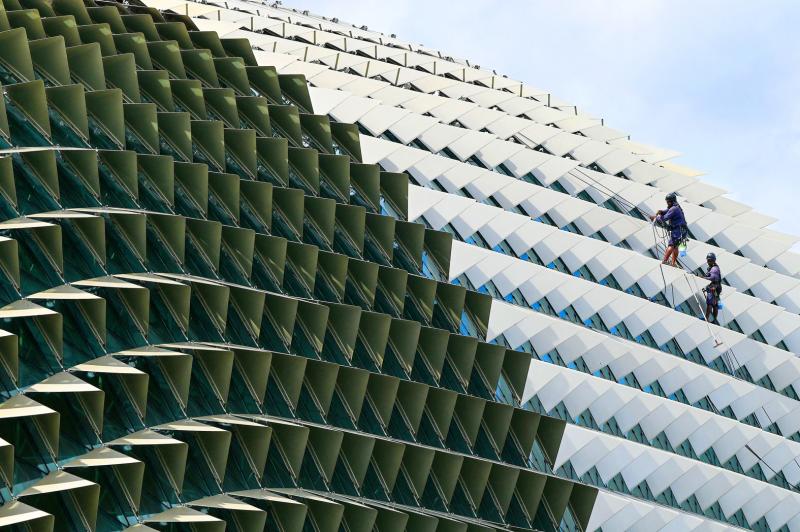Singapore plans to set up pilot programs to allow business travelers vaccinated against COVID-19 from some countries to enter on controlled itineraries next month as it charts a cautious international reopening that extends to local restrictions.
Singapore is in talks with Germany, Australia, Canada and South Korea to be the first batch of countries for such arrangements, although it is also looking at the possibility of leisure travel, Singaporean Minister for Trade and Industry Gan Kim Yong (顏金勇) told Bloomberg News in an interview yesterday.
Factors such as infections, vaccination rates and the ability to control outbreaks would be considered in these discussions, Gan said.

Photo: AFP
“In the pilot, we are likely to focus more on business travel, but beyond business travel, we are also looking at the possibility of leisure travel, particularly to those safer countries, those with a lower infection rate,” he said. “We will need to pilot-run some of this with an organized itinerary, probably with organized tour groups, to be able to find ways to bubble-wrap them for the journey and with specific designated places that they can visit.”
Singapore — which has a vaccination rate that is among the world’s highest, according to Bloomberg’s Vaccine Tracker — is aiming to reopen to the world and emerge from the pandemic relatively unscathed by high hospitalizations and death tolls.
At 76 percent full inoculation, the country is on track to be ahead of its schedule to reach 80 percent by early next month, a milestone where officials have pledged to ease more measures, particularly on border reopening.
Still, such relaxation will be done in a careful manner and local rules on gathering sizes could still be intact for a while as more people enter the country, Gan said.
“The two are interlinked,” he said. “If we continue to keep our borders closed and just among ourselves, I think we will be quite ready to open up domestically, but because we are going to open up the border, which is a major effort, and potentially a higher-risk measure, therefore we will need to ensure that domestically within the community we continue to have reasonable basic safe management measures in place.”
Already, Singapore is loosening controls to allow vaccinated foreign workers to enter the country, as well as plans to bring in laborers in the construction sector.
“We may be the first country who has a high vaccination rate, and yet taking a step-by-step approach to reopening,” Gan said. “We are seeing whether this approach in fact is a better approach to allow a safe opening, yet at the same time allow more activities to happen.”
Such a move might ultimately prevent a reversion to lockdown measures, which have frustrated businesses and residents, he said.

Taiwan will prioritize the development of silicon photonics by taking advantage of its strength in the semiconductor industry to build another shield to protect the local economy, National Development Council (NDC) Minister Paul Liu (劉鏡清) said yesterday. Speaking at a meeting of the legislature’s Economics Committee, Liu said Taiwan already has the artificial intelligence (AI) industry as a shield, after the semiconductor industry, to safeguard the country, and is looking at new unique fields to build more economic shields. While Taiwan will further strengthen its existing shields, over the longer term, the country is determined to focus on such potential segments as

UNCERTAINTY: Innolux activated a stringent supply chain management mechanism, as it did during the COVID-19 pandemic, to ensure optimal inventory levels for customers Flat-panel display makers AUO Corp (友達) and Innolux Corp (群創) yesterday said that about 12 to 20 percent of their display business is at risk of potential US tariffs and that they would relocate production or shipment destinations to mitigate the levies’ effects. US tariffs would have a direct impact of US$200 million on AUO’s revenue, company chairman Paul Peng (彭雙浪) told reporters on the sidelines of the Touch Taiwan trade show in Taipei yesterday. That would make up about 12 percent of the company’s overall revenue. To cope with the tariff uncertainty, AUO plans to allocate its production to manufacturing facilities in

COLLABORATION: Given Taiwan’s key position in global supply chains, the US firm is discussing strategies with local partners and clients to deal with global uncertainties Advanced Micro Devices Inc (AMD) yesterday said it is meeting with local ecosystem partners, including Taiwan Semiconductor Manufacturing Co (TSMC, 台積電), to discuss strategies, including long-term manufacturing, to navigate uncertainties such as US tariffs, as Taiwan occupies an important position in global supply chains. AMD chief executive officer Lisa Su (蘇姿丰) told reporters that Taiwan is an important part of the chip designer’s ecosystem and she is discussing with partners and customers in Taiwan to forge strong collaborations on different areas during this critical period. AMD has just become the first artificial-intelligence (AI) server chip customer of TSMC to utilize its advanced

Chizuko Kimura has become the first female sushi chef in the world to win a Michelin star, fulfilling a promise she made to her dying husband to continue his legacy. The 54-year-old Japanese chef regained the Michelin star her late husband, Shunei Kimura, won three years ago for their Sushi Shunei restaurant in Paris. For Shunei Kimura, the star was a dream come true. However, the joy was short-lived. He died from cancer just three months later in June 2022. He was 65. The following year, the restaurant in the heart of Montmartre lost its star rating. Chizuko Kimura insisted that the new star is still down